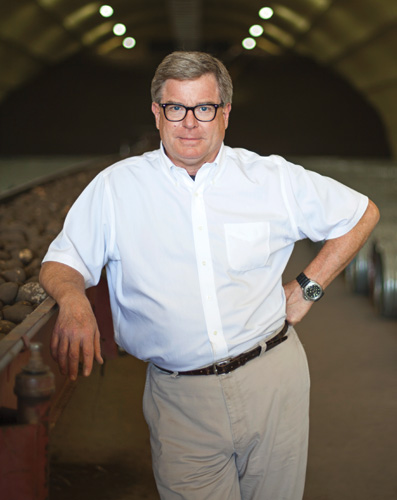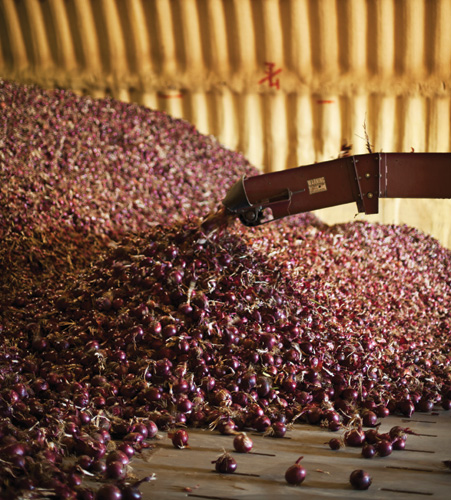 You won’t catch Bob Hale crying over onions — whole, processed or fresh cut. The CEO of River Point Farms in Hermiston, Hale presides over the largest onion growing and processing operation in the country, with 450 million pounds of overall onion volume each year.
You won’t catch Bob Hale crying over onions — whole, processed or fresh cut. The CEO of River Point Farms in Hermiston, Hale presides over the largest onion growing and processing operation in the country, with 450 million pounds of overall onion volume each year.
BY LINDA BAKER
 |
// Photo by Sierra Breshears |
CEO: Bob Hale Founded: 2007 Employees: 670 Fun Fact: Supplies 100% of red onions to all 23,000 North American Subway restaurants |
You won’t catch Bob Hale crying over onions — whole, processed or fresh cut. The CEO of River Point Farms in Hermiston, Hale presides over the largest onion growing and processing operation in the country, with 450 million pounds of overall onion volume each year. The company grossed $70 million this past year and is on track to gross $100 million by 2018.
Some of that growth is expected to result from a deal Hale struck this past fall, when he and his brother Rick bought back control of River Point, which has roots in a small farm Hale purchased back in 1977.
The purchase will allow River Point to expand its growing, production, packing, shipping and product offerings. It also reflects the onion grower’s vertically integrated business strategy. “What differentiates us is we not only plant the seed, but we control the process from planting to harvesting to storing to fresh-cut processing to packaging to shipping,” Hale says. “We are seed to shelf.”
Headquartered in Northeastern Oregon, River Point supplies about 60 contract customers, including industrial ingredient, food service and restaurant chains such as Subway, Wendy’s, Panera and Chipotle. The company also sells to many grocery stores. Its big-league success is rooted in natural as well as strategic causes, Hale says.
“I always say I chose to be born in the Columbia Basin because there’s no better place to grow onions in the world,” says 59-year-old Hale, who grew up in Echo and now splits his time between Hermiston and Portland, where his wife, Kelly, is a senior vice president with RBC Wealth Management.
Capitalizing on the area’s sunny days and a long growing season, River Point has implemented several initiatives to help ensure customers don’t decamp for the competition. The nation’s onion consumption is “fairly inelastic,” with consumption growing about 4% to 5% a year, says Hale. “So for us to grow, we have to take market share from someone else.”
One tactic is to supply national brands year-round, a commitment aided by River Point’s state-of-the-art climate-controlled warehouses, which are capable of storing 300 million pounds of bulbs, available for shipping at the customer’s request. To meet client demand, the company also grows onions in four states: Oregon, Washington, Idaho and California. Hale now has his eye on Texas and Georgia, states that will put River Point onions closer to East Coast markets.
{artsexylightbox singleImage=”/images/stories/articles/archive/novdec2013/slideshow-intro-Farm.jpg” path=”/images/stories/articles/archive/novdec2013/riverpoint/”}{/artsexylightbox}
 |
 |
// Photos by Sierra Breshears |
In total, River Point grows about 6,000 acres of onions per year, utilizing a land base of about 85,000 acres from strategic partners, including longtime Umatilla farmer Bob Levy and sister company Hale Farms, a diversified farming operation that grows carrots, peas, corn, potatoes and blueberries, and is also controlled by the Hale brothers. Collectively, Hale Farms and River Point employ about 670 full-time workers and process about 1,500 W2s annually.
The in-house farmer network is one example of River Point’s vertically integrated strategy. The company also operates its own packaging and processing facilities — “and puts the seed in the soil,” says Hale. Such “source-based” practices have become increasingly important as food-safety issues take center stage, he says. “National brands now want to contract directly with the growers. They want to understand the entire supply chain.”
Nurturing close relationships with customers also creates efficiencies, an important aspect of doing business in an industry that competes largely on cost. River Point asks customers what they want before planting, prioritizes tightly managed supply chains, and prides itself on consistently delivering 180 semi-truckloads per week on time.
About that buyback deal: In 2007 the Hale brothers sold a controlling interest in River Point to the Dallas-based private equity firm, CIC Partners. The recent purchase, which wrapped in Salinas-based Taylor Farms and several other investors and partners, allowed the Hales to take back controlling interest. “We are Oregonians; we love the company,” says Hale, adding that the purchase puts River Point “in local hands to make local decisions.”
The ownership structure will enable River Point to begin expanding their retail business with Taylor Farms and Curry & Company in Brooks. The onion grower will also update facilities to meet the needs of contract customers and the new retail operations.
Expansion is on the horizon. But even as River Point tackles new initiatives, the grower is immersed in a longstanding battle: lobbying for a larger share of irrigation water from the Columbia River to fuel economic development in the Umatilla Basin region. River Point’s center pivot irrigation systems save millions of gallons of water per year, Hale is careful to note. “But we’re fighting for a way of life in Hermiston,” he says. “And it doesn’t exist without water.”
Finding enough available irrigated land to grow the company is one of River Point’s constant challenges. Yet the water wars don’t faze Hale, who continues to build his privately held, family-controlled onion empire layer by layer. “I love onions,” he says. “I’m passionate about the food industry. And I love what we do: grow food to feed people.”

